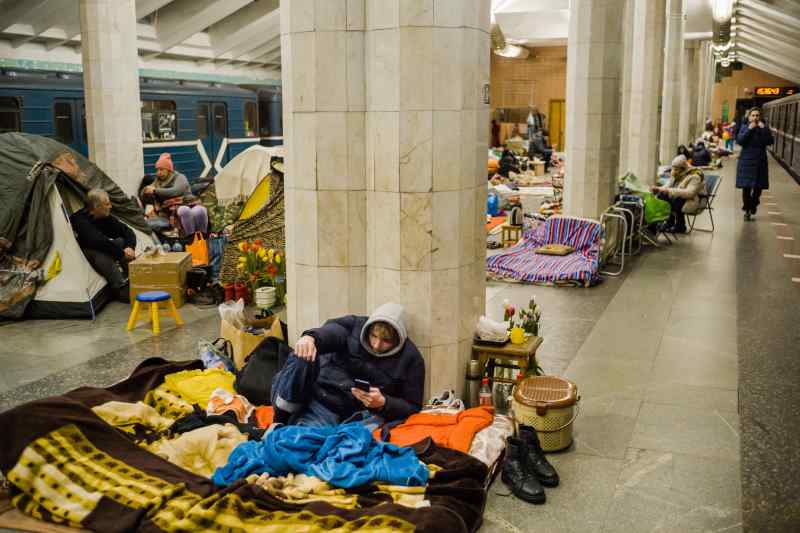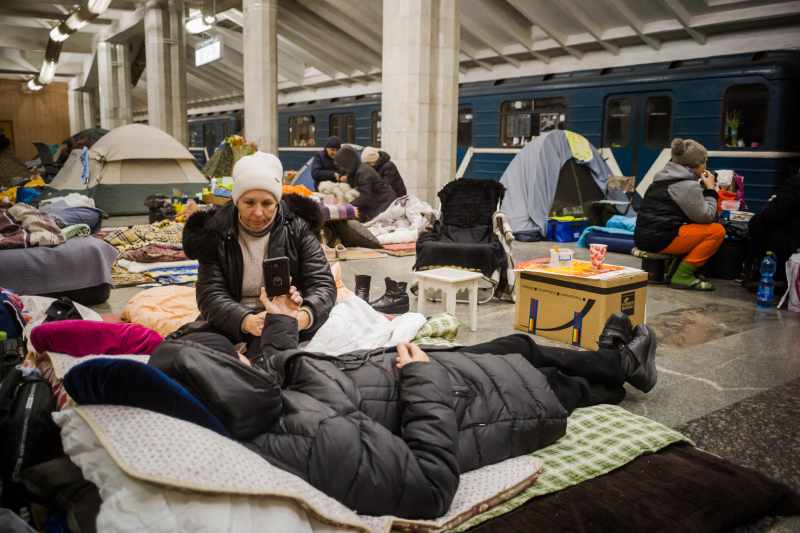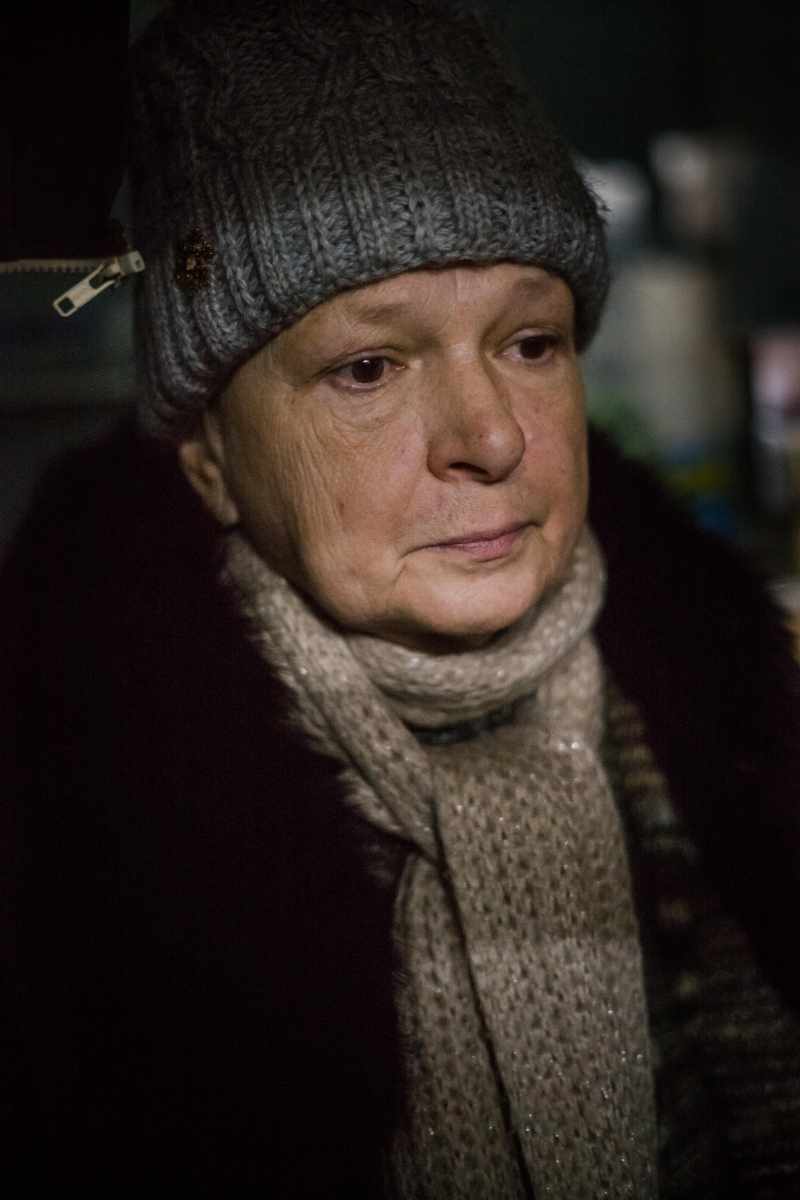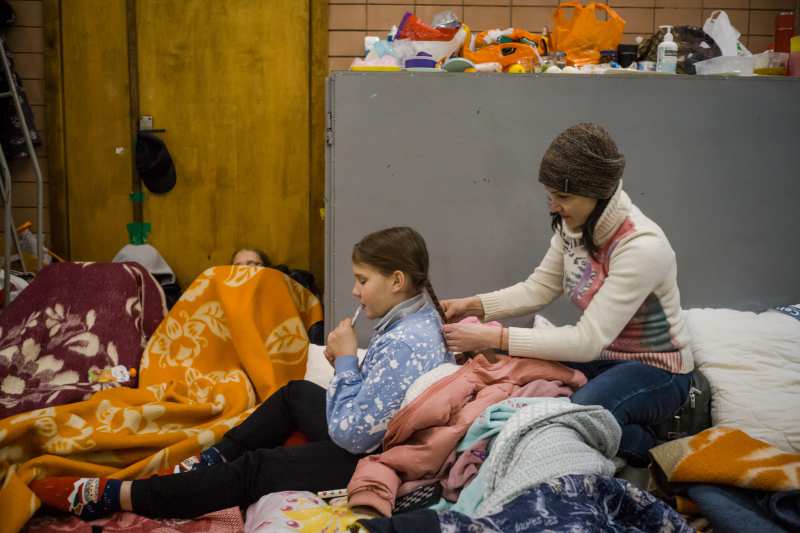
A subway station in Kharkiv, Ukraine, that was originally designed during Soviet times as a nuclear shelter is now housing people whose homes were destroyed.
14:23 JST, March 22, 2022
KHARKIV, Ukraine – A bunch of tulips sits in the window of the subway car that Vladlena Igorivna, her mother and two young sons have slept in for more than three weeks. It’s a small reminder of the outside world in an otherwise nearly entirely subterranean life.
Trips up the escalators for fresh air are rare, and brief. Their eyes, so used to their new dim surroundings, hurt in the sunlight. Her sons Nazar, 6, and Makar, 3, are scared of being outside.
“The kids hear the bombs go off and they want to come down again,” Igorivna, 31, explained. “Every day I want to go out for a walk, but I can’t. I just want to go home.”
For nearly a month, thousands of Kharkiv residents have lived deep underground in the city’s metro system to shelter from a daily rain of artillery, rockets and cluster bombs. Moscow’s assault on its neighbor has uprooted 10 million people – a quarter of Ukraine’s population – in a matter of weeks.
In Kharkiv, the county’s second-largest city, at least half of its 1.4 million residents have fled, according to officials, though no one is sure of the exact figure. The city is eerie and desolate, its downtown ravaged by missiles that have struck around its vast central square.
For some residents who remain, the city’s metro system, built to withstand nuclear war, feels like the safest place to be. Tents and mattresses dot the platforms, while the subway cars have been parked with their doors open to give a little more shelter. Children chase each other on the escalators, the favored playground in this underground village.
“It’s like a small town and I’m the sheriff,” said Olek Kucha, as Igorivna’s younger son, Makar, clings to his hand. There are about 50 kids living in this one station, among around 200 or 300 people. They’ve drawn pictures supporting the Ukrainian armed forces that have been stuck on one of the station’s marble columns.
Instead of announcing train delays, the speaker system now tells the inhabitants that volunteers have arrived with food. There are electric kettles, but there’s no place to cook. Around 25 people sleep in Igorivna’s subway car, where clothes hang from the handrails and boxes of food line the floor. “We’ve been here for a long time; we are all like a big family,” she said.
Igorivna, a single mom, says it’s too difficult and dangerous to leave. They have no vehicle and nowhere to go. Besides, this is their city.
“We are Kharkiv people to the core,” explained her mother, Yelena, 61. “We had such a beautiful city. They bombed our zoo, our churches; they bombed all the pretty things that we had.”
The widows of their apartment were blown out by an explosion.

Natalia and Juri, both 60, have been camping out with their grandchildren in a subway station.
Like many of the people sheltering in their station, they’ve been in the subway since the first day of the war, Feb. 24. They were awakened by an explosion that morning, but still didn’t believe the war had begun.
It was only when Yelena checked the news that it sank in. They left for the subway that day and haven’t left. At first people slept sitting up on the benches. It was so crammed that others had to sleep on the upper floor by the turnstiles because the platforms were full.
Everyone thought they’d be there just a night or two.
Igorivna sat up with her two sons on either side of her, their heads in her lap. Now, they nap in the afternoons and can’t sleep in the evenings. And they keep getting sick.
“It’s very hard to put them down for the night,” she said. “They can’t sleep normally.”
Police guards asked that the name of the station, one of many that now serve as shelters, not be revealed for fears that it might make it a target for Russian bombs. It was originally designed as a refuge from Western ones.
The Kharkiv metro opened in 1975, during the height of the Cold War, becoming the sixth metro system in the Soviet Union. Kucha points out the thick metal doors that are designed to protect civilians in case of a nuclear attack.
Now they seal them every night at 6 p.m., when the city goes under curfew. When Mazar and Nazar are awake, they spread joy through the wagon.

Valentina Kryvokolysko in the subway car where she now sleeps.
“He calls out, ‘Babushka, I love you,'” Valentina Kryvokolysko, 61, who sleeps on the bench at the far end, says of Mazar. “He’s such a ball of positivity, we are so lucky to have him.”
But she cries as she talks about her own 6-year-old grandchild, who is in another shelter on the city’s far edges. The bombardment is heavier there. She lived alone, and has no family in the subway with her, except her newly found one.
The cats, named Zefir and Abrikos – “marshmallow” and “apricot” – help too. Marshmallow used to not like people, but has had to adjust. Irina Martinova, 49, with bouncing blonde curls, brought them down when she fled underground with her husband and her son on the first day of the war. Her husband went back to continue his work at the water plant.
He’s supposed to do three-day shifts before having a break, but he ends up sleeping there the whole time. They are short-staffed because so many people have left. In its attack on the southern city of Mariupol, Russia was quick to target critical civilian infrastructure.
“Of course I worry,” Martinova said. “I always tell him to go to the basement.”
Kharkiv has borne the brunt of previous wars, the target of four battles between Germany and the Soviet Union during World War II, switching hands twice. The memory of the 1930s Holodomor, or “great famine,” during which 4 million Ukrainians died during the forced collectivization of farms by Joseph Stalin, still fuels some resentment of Moscow here.
Svetlana Yaroslavskaya, who also sleeps in the subway car, recounts how her mother and grandmother, deemed part of the aristocracy, were taken to a gulag in 1937 and only released when Stalin died in 1953. “My mother cried her whole life about the pain,” she said. “It was very harsh times, brutal.”
“There is generational memory of the horror of war,” said Martinova, as she eats popcorn that’s been handed around the carriage. The three women chat in the center of the subway car.
They are shocked it’s happening again. Kharkiv, a Russian-speaking city, lies just 25 miles from the border.
“No one would tell you a bad word about the Russian tongue, we love it,” said Kryvokolysko. “But they hate us.”
She brings out a small silver picture of Mary and Jesus. She wasn’t that religious before, but you have to hope for some kind of higher power, she said.
“I feel hate,” said Martinova. “It’s not that I hate the people, but I hate the enemy, and that will last for a long time.”
The carriages are warmer, so are largely reserved for families, with young children or the elderly. Some have moved in as spots have opened up when other people have left the country. Alina Biloshytska, 25, had just started a new job as a social media manager when the war started. Now she stays here alone, waiting for news from her husband on the front lines.
“I can’t leave without him,” she said, sitting on a subway bench in crocheted slippers.
She cried a lot at first, but she clings to the few moments that he comes online and can message with her. They are becoming less frequent. “He won’t even tell me where he is.”

Natalia braids her daughter Daria’s hair in the metro station.
Mila, 3, the other child in the carriage, takes a walk outside with her dad, Stas Sachno, 36. His wife has dashed home to feed and walk their German shepherd; they take turns.
They don’t have a bomb shelter in their building, so the metro has been home since Feb. 25, when the bombing near their home got too loud.
They sleep at the end nearest the tulips. The volunteers brought the flowers for International Women’s Day on March 8. They would probably have wilted by now aboveground, but here in the cool, dark underground, they’ve lasted longer.
Mila, who has a scrape on her nose from where she fell off the escalators, is sick again, but had wanted to come out. Sachno calls her back as she begins to wander away from the steps into the station.
The sounds of two loud explosions ring out, but the 3-year-old doesn’t flinch.
“She knows whether to ask if it’s ours or incoming,” said her mother, Alexandra Cakhno, 28, after she returned.
They didn’t leave because of their dog and the two cats. The fish died because the apartment got too cold while they were gone. Cakhno’s husband also recently had a back operation.
“Imagine, cats, dog, a daughter and he can’t carry anything,” she said.
But she’s not sure how long they can sit it out.
“There are moments when I think, ‘Let’s get the animals and leave,'” she said. “Then there are moments I think, ‘Let’s stay to the end; why should we?'”
Top Articles in News Services
-

Survey Shows False Election Info Perceived as True
-

Prudential Life Expected to Face Inspection over Fraud
-

Hong Kong Ex-Publisher Jimmy Lai’s Sentence Raises International Outcry as China Defends It
-

Japan’s Nikkei Stock Average Touches 58,000 as Yen, Jgbs Rally on Election Fallout (UPDATE 1)
-

Japan’s Nikkei Stock Average Falls as US-Iran Tensions Unsettle Investors (UPDATE 1)
JN ACCESS RANKING
-

Japan PM Takaichi’s Cabinet Resigns en Masse
-

Japan Institute to Use Domestic Commercial Optical Lattice Clock to Set Japan Standard Time
-

Israeli Ambassador to Japan Speaks about Japan’s Role in the Reconstruction of Gaza
-

Man Infected with Measles Reportedly Dined at Restaurant in Tokyo Station
-

Videos Plagiarized, Reposted with False Subtitles Claiming ‘Ryukyu Belongs to China’; Anti-China False Information Also Posted in Japan
























